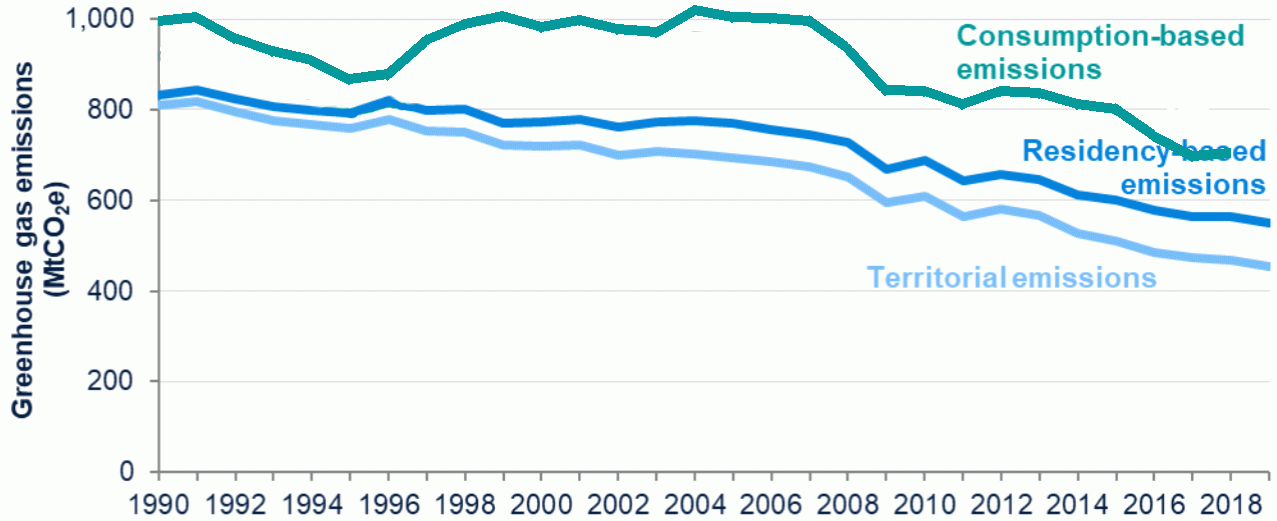The UK's True Carbon Emissions
Climate-change deniers and the UK government like to claim that "UK greenhouse gas emissions have fallen by 42% since 1990".
This statistic deliberately excludes greenhouse-gas emissions from flights, shipping and the manufacture of imported goods, which are all rising. This misleading measure is referred to as Territorial Emissions. All signatories to the Kyoto Protocol, such as the UK, are legally obliged to report Territorial Emissions. The downward trend is caused mostly by the switch from coal-fired power generation to gas, wind and solar.
The truth is that between 1990 and 2018 our true CO₂ (equivalent) emissions fell by around 29%, from 995 to 703 MtCO₂e.
This partially more honest account is referred to as our Consumption-based Emissions. These have been reported by DEFRA (Department for Environment, Food and Rural Affairs) since 1990. The chart above comes from https://assets.publishing.service.gov.uk/government/uploads/system/uploads/attachment_data/file/957887/2019_Final_greenhouse_gas_emissions_statistical_release.pdf with the latest Territorial Emissions updated from "Data download consumption emissions 1990-2018" on https://www.gov.uk/government/statistics/uks-carbon-footprint.
The UK's consumption emissions in 2018 were around 40% higher than our territorial emissions.
That's Just The Easy Bits
The reductions in UK emissions since 1990 are caused almost exclusively by market forces: we switched electricity generation from coal to gas because it was cheaper; we outsourced our manufacturing industry abroad because it was cheaper; after initial government subsidies, electricity generation has been migrating from gas to wind, because it is cheaper.
Unfortunately, to reach zero emissions, we urgently need the government to tackle the expensive, difficult bits. For example:
- Home insulation comes with heavy up-front costs and we need enough skilled tradesman to insulate 25m+ homes.
- Electric cars come with heavy up-front costs.
- Millions of oil and gas boilers need to be replaced.
- Storing enough energy to supply electricity for weeks when the wind doesn't blow won't be cheap.
There is currently no visible policy to achieve any of this, and it's not going to happen without government action.
Leaking Methane
Even our consumption-based emissions are under-counting the consequences of burning gas:
About 40% of the UK's energy consumption in 2020 was supplied by methane - see https://www.iea.org/countries/united-kingdom. One rationale for the switch from coal to gas for our energy needs is that gas has lower CO₂ emissions per unit of energy supplied.
The IEA's Global Methane Tracker Report (https://www.iea.org/reports/global-methane-tracker-2022/overview) estimates that in 2021 "of the 135 million tonnes of energy-related emissions, an estimated ... 39 Mt are from extracting, processing and transporting natural gas" plus "4 Mt [of] leaks from end-use equipment". It's difficult to measure methane leaks and the fossil-fuel industry has no incentive to self-report honestly, so this number is likely to be an underestimate.
Page 38 of BP's Statistical Review of World Energy 2021 (https://www.bp.com/content/dam/bp/business-sites/en/global/corporate/pdfs/energy-economics/statistical-review/bp-stats-review-2021-full-report.pdf) reports that in 2020 the UK consumed 72.5bn m³ of natural gas out of world total of 3,822.8bn m³.
To report honestly our territorial emissions, we need to include the global warming caused by the proportion of world total methane that leaked on its way to supplying our domestic consumption. That's (39Mt + 4Mt) x 72.5 / 3,822.8 = 0.81Mt. It would be nice to imagine that gas is extracted more diligently from the North Sea, reducing leakage, but it's not measured. Furthermore, "the UK imports around 50% of its gas from the international market" according to https://www.ons.gov.uk/economy/nationalaccounts/balanceofpayments/articles/trendsinukimportsandexportsoffuels/2022-06-29.
By mass methane has 27.9 times the warming effect of CO₂ (see https://en.wikipedia.org/wiki/Global_warming_potential) so 0.81Mt methane has the same warming effect as 22Mt CO₂. So our territorial emissions of CO₂(equivalent) are underestimated by about 5%.
Methane Leaking from Oil Production
The same sources as above and similar calculations demonstrate that:
- In 2020 the UK consumed 1.23 million barrels of oil per day out of world total of 91.3 million barrels.
- "Of the 135 million tonnes of energy-related emissions, an estimated ... 41 Mt [are] from oil"
- The UK's share is 41Mt x 1.23 / 91.3 = 0.55Mt.
- 0.55Mt methane has the same warming effect as 15Mt CO₂.
So our territorial emissions of CO₂(equivalent) are underestimated by a further 3%.
Methane Leaked on our Behalf
It's worse than this even. To report honestly our consumption-based emissions we need to take account of the methane leaking on route to supply energy overseas to manufacture the billions of pounds of goods we import.
Net-Zero Is Not Zero
By the way, the UK government's much vaunted commitment to net-zero by 2050 applies only to territorial emissions and ignores consumption-based emissions. See "3. Measuring the UK's progress to net zero" on https://www.ons.gov.uk/economy/environmentalaccounts/articles/netzeroandthedifferentofficialmeasuresoftheuksgreenhousegasemissions/2019-07-24
Notes:
- The consumption-emission statistics are classified as "experimental" due to inherent uncertainties. They are also produced with a longer lag (the latest year is 2018) given the detailed modelling of global supply chains which is required.
- While the amount of goods consumed in the UK is well known from official Government statistics on imports and exports, the total emissions associated with producing UK imports is much harder to determine: it depends on estimates of how commodities are produced in all of the countries that the UK imports from, either directly or via intermediaries, and the emissions associated with each part of those supply chains.
Credits
Thank you to my friends Alex Zeffertt and Dan Collicot for their help with this page.
Back to Arctic Death Spiral | About | Sitemap
Twitter: @ArcticDthSpiral | Instagram: @ArcticDeathSpiral
